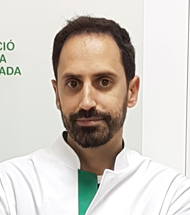"In Spain, we are moving towards a more assistance-based pharmacy, not only based on dispensing".
Baltasar Pons (Far 01) has received the award TEVA for the best service and the award for the best pharmacist of 2016.

PHOTO: Courtesy
For the graduate in Pharmacy Baltasar Pons (Far 01) the future of pharmacists lies in the partnership multidisciplinary within health teams that pivot on the central goal to help and care for the patient.
- Two years ago you won the award TEVA for best service and last month you won the award for best pharmacist of the year 2016. What did both awards mean to you?
They are a recognition to the work we have been doing for years in the pharmacy. It was a great illusion. We did not expect to win either of them. In fact, being finalists was already a very important achievement? Both awards are intended to recognize all pharmacists who make a more caring pharmacy and are concerned that the profession advances, that community pharmacy improves, etc.
- How do you think your training at the University of Navarra helped you in relaunching your pharmacy?
I think that what helped was the level of my colleagues, which meant that we left degree program very well trained. Also, being far from home, and finding such a pleasant environment as Pamplona, is a big plus. In addition, when I finished the degree program and returned to Mallorca I took with me many ideas learned at the Degree that could help to improve the service we provided. In fact, we applied them and our work benefited a lot.
- What would you say are the differential points of the degree program of Pharmacy at the University of Navarra?
First of all, that we studied alongside other Schools, such as Medicine and Nursing, with whom we shared subjects. As a result, links were created which, in my case, helped me to become a member of medical and pharmaceutical societies, and of groups where we collaborated in a collaborative way multidisciplinary to improve patient health, which is the point of union of all health professionals.
- Where do you think model pharmacy is heading in Spain?
The model is moving towards a more assistance-based pharmacy, not only based on dispensing. Patients are demanding more and more services from us, such as control of cardiovascular risk factors, smoking cessation, nutrition.... And we must train ourselves to offer quality professional pharmaceutical services.
- What major challenges do you think the sector is facing right now?
The main challenge challenge is to fight against decrees that are increasingly stifling us, such as the auctions in Andalusia. Or against regional laws that hinder us when it comes to dispensing. On the other hand, we must collaborate more and more with other professionals and form multidisciplinary teams around the patient.
